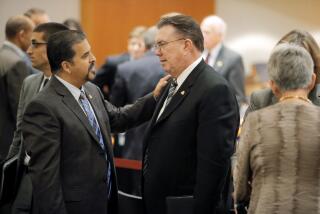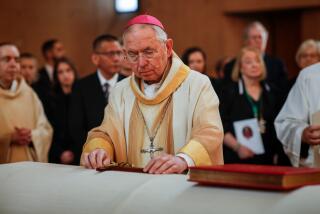God and Lancaster
For decades, the courts have wrestled with the issue of public prayer and the clause in the 1st Amendment that separates church and state. They’ve concluded that prayers said in a legislative body are fine, as long as they are not used to proselytize, promote one religion or disparage another. But how do you assess that? One person’s benign reference to Jesus Christ is another’s definition of promoting one religion.
When two citizens — one Jewish, one Christian — sued the Lancaster City Council last year over its practice of opening council meetings with a prayer, they argued that the mention of Jesus Christ violated the Constitution. (The particular invocation they cited concluded: “in the precious, holy and righteous and matchless name of Jesus I pray this prayer.”)
The plaintiffs’ attorney did not argue that the council’s prayers should be prohibited — only that they should stop referring to Jesus Christ. Naming any deity, he says, promotes that religion and makes others feel like outsiders. But U.S. District Judge Dale Fischer disagreed, and ruled that the plaintiffs failed to show that the prayers had the effect of aligning the City Council with a particular religion.
Lancaster officials have said that the city clerk methodically searched for all religious congregations of every faith in the city and invited them to volunteer to give the invocations. (Although, for a variety of reasons, in the last year most have been Christian.)
A higher court may render a different decision. In the meantime, the Lancaster City Council is legally entitled to open its sessions with prayers to Jesus Christ or any other deity. Now that it has established that, it should do the right thing and stop.
Lancaster is under a lot of scrutiny these days for not being particularly inclusive. The city is being sued by civil rights advocates for allegedly attempting to drive out black and Latino residents who receive federal public housing assistance. The U.S. Department of Housing and Urban Development has filed its own complaint against the city for the same allegations.
The year before the prayer lawsuit was filed, the American Civil Liberties Union of Southern California warned Lancaster officials that it had received complaints about the council opening meetings with prayers in the name of Jesus Christ and other sectarian references. And Mayor R. Rex Parris has been quoted saying: “We are growing a Christian community, and we should not shy away from that.” He explained later that he meant only “a community where we love our neighbors.”
This would be a good time for official Lancaster to be neighborly — and it could start by not alienating any more residents with controversial invocations. Even though a city referendum allowing sectarian prayers passed last year, we agree with the plaintiffs in this case that people of all religious beliefs should be able to attend public meetings without feeling marginalized.
At the very least, the council should request non-denominational prayers — in the spirit of reaching out to everyone. Surely Jesus would approve of that.
More to Read
A cure for the common opinion
Get thought-provoking perspectives with our weekly newsletter.
You may occasionally receive promotional content from the Los Angeles Times.






